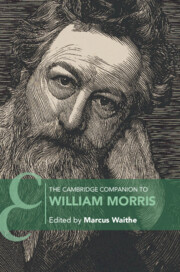Book contents
- The Cambridge Companion to William Morris
- The Cambridge Companion to William Morris
- Copyright page
- Dedication
- Contents
- Figures
- Notes on Contributors
- Acknowledgements
- Note on The Collected Works
- Chronology
- Abbreviations
- Introduction
- Part I Senses of Place
- Part II Authorship
- Part III The Practical Arts
- Part IV Movements and Causes
- Chapter 15 Practical Socialism
- Chapter 16 Morris and the Arts and Crafts Movement
- Chapter 17 Female Fellowship
- Chapter 18 Landscape and Environment
- Part V Influences and Legacies
- Guide to Further Reading
- Index
- Cambridge Companions To …
Chapter 15 - Practical Socialism
Newspaper and Propaganda Work
from Part IV - Movements and Causes
Published online by Cambridge University Press: 03 May 2024
- The Cambridge Companion to William Morris
- The Cambridge Companion to William Morris
- Copyright page
- Dedication
- Contents
- Figures
- Notes on Contributors
- Acknowledgements
- Note on The Collected Works
- Chronology
- Abbreviations
- Introduction
- Part I Senses of Place
- Part II Authorship
- Part III The Practical Arts
- Part IV Movements and Causes
- Chapter 15 Practical Socialism
- Chapter 16 Morris and the Arts and Crafts Movement
- Chapter 17 Female Fellowship
- Chapter 18 Landscape and Environment
- Part V Influences and Legacies
- Guide to Further Reading
- Index
- Cambridge Companions To …
Summary
After his conversion to socialism in 1883, William Morris expressed again and again his hope of replacing the ‘cannibalism’ and ‘stupendous organization – for the misery of life’ that characterized modern civilization with the community of liberated equals pursuing satisfying and meaningful work that he saw in socialism (CL, ii.480; CW, xxiii.279). In his own account of his political awakening to the causes and cures of poverty and inequality he described himself as a ‘practical Socialist’ with little interest in politics for politics’ sake. Indeed, he embarked on a relentless programme of propaganda and agitation for the cause: he gave speeches, founded and edited a newspaper, Commonweal, and wrote protest chants, political poems, articles and sketches as well as contributing to pamphlets and leaflets on aspects of socialism in the present and future. This chapter examines the range of Morris’s journalistic and propaganda writings and the ways they formulate and express his practical but never narrowly pragmatic socialism. His recurring emphasis on the interconnections of art, beauty, environment and communities of many kinds shapes an internationalist, revolutionary ideal of socialism founded on and arrived at through fellowship, imagination and action.
- Type
- Chapter
- Information
- The Cambridge Companion to William Morris , pp. 203 - 214Publisher: Cambridge University PressPrint publication year: 2024



